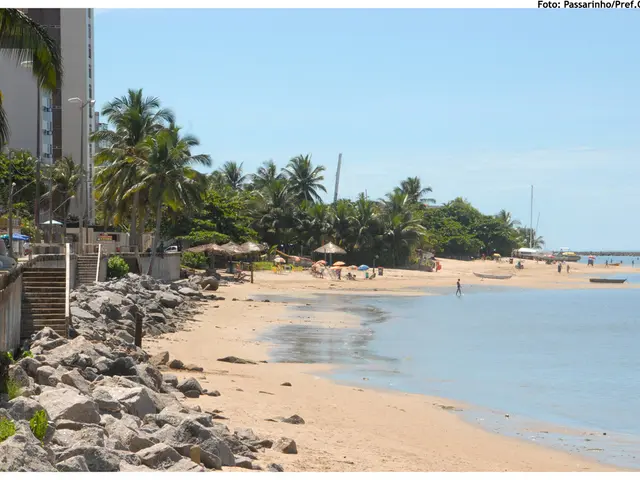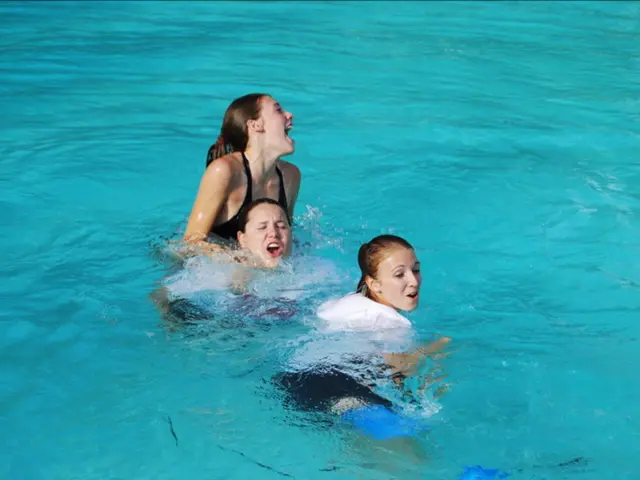A Terrifying Dive Gone Wrong: The Egypt Submarine Tragedy
Instant Fatalities: Latest Reveals on Russian Casualties in Egypt
In a harrowing turn of events, a sightseeing bathyscaphe named "Sinbad" sank off the Egyptian coast of Hurghada on March 27. This calamity claimed at least six lives, including two children, among a group of Russian tourists. Reports suggest that the submarine started to descend while passengers were embarking, and awful details hint at a lack of required safety measures and training among the crew.
According to eyewitness accounts on the Telegram channel, SHOT, tourists were rowed about a kilometer from the shore to the bathyscaphe to explore the enchanting underwater world of the Red Sea. One Russian tourist noted that a crew member claimed not to know how to swim but was dismissed as a joke. Alas, the jest soon turned into a nightmare as the submarine began to plunge, with its hatches open, according to the same channel. Those on the deck missed their chance to dash into the observation compartment, and they had to save those struggling in the water. Terror-stricken screams and cries for help echoed inside the sinking submarine, filled with adults and children alike.
The Ministry of Health in Egypt later confirmed the tragic death toll at six, with 23 injured individuals. Following the devastating loss, Russia's Consul General, Victor Voropaev, confirmed that the bathyscaphe started sinking during passenger boarding and rapidly submerged underwater. An investigation into the root cause of the accident is currently underway. Viet Voropaev also emphasized that the family members of the deceased will be handled by insurance companies, while eight injured individuals remain hospitalized, their condition deemed stable.
To avoid a repeat of such catastrophes, Dmitry Arutunov, a tourism expert, advises Russians to secure expanded insurance for extreme excursions. Arutunov stresses the importance of being properly insured, as insurance companies conduct thorough scrutiny to cover such adventurous activities. He also cautions vacationers against purchasing excursions directly from beaches, as problems with boats in Egypt, especially during peak season, are disturbingly common.
The Shabby History of the Condemned Bathyscaphe "Sinbad"
A Russian woman named Алена shared her harrowing recollections of the "Sinbad" from her visit to Egypt eight years ago. The bathyscaphe, boasting a fresh, new appearance, was actually a shabby, poorly maintained vessel filled with torn seats and scratched interiors, despite reassurances encouraging tourists to embark on a submarine ride. Even then, no safety briefing took place, and no life jackets were provided.
Виктория, a tourist who visited Hurghada in 2024, relayed her nerve-wracking experience aboard the "Sinbad" excursion. She describes the trip as a white-knuckle ride, fraught with safety violations, as regulations were flouted during the tour in poor weather conditions. The experience was traumatic, leaving a lasting impression that they would not risk boarding such a vessel again.
Danil, yet another Russian man, shared a similar experience. He describes the submarine experience as uncomfortable and dangerous, marred by an underwhelming guide's exaggerated hype. The guide's words rang hollow, as the voyage turned out to be a disappointing, damp, and scary affair, with no clear explanation or demonstration of where life jackets were located. Though the vessel didn't seem to be sinking, they still felt apprehensive, and in hindsight, they see the tragedy as a tragic inevitability.
Marjana, a Russian woman who stayed at the "Sinbad" hotel in Hurghada in the early 2000s, shares her earlier concerns about the underwater excursion. However, seduced by the allure of the underwater world, she joined the namesake vessel. Unshackling from the pontoon boat trembling in the waves, she recounts no safety briefings about evacuation procedures or life jackets, nor did she see any life-saving equipment on board during the excursion. The vessel plunged beneath the waves, and water trickled in through the hatch, causing discomfort and alarm.
Users of the internet shared their recollections of bathyscaphes in Egypt after the "Sinbad" calamity. A Telegram channel subscriber named Sergei vividly recalls a trip 18 years ago, boarding either the "Sinbad" or a similar vessel, but he describes the experience as claustrophobic and unpleasant. An internet user named Huxley Huxley refrained from boarding the bathyscaphe in Egypt during her recent visit due to safety concerns. Another user, Victoria Mishina, notes that several tourists fell ill during the excursion in the submerged apparatus, including herself, despite never previously experiencing seasickness.
Some tourists advocate for snorkeling trips or boat rides with transparent bottoms rather than taking the risk on bathyscaphes. Olga, a user, expressed dissatisfaction with the "Sinbad" submarine ride, as they hoped to witness a beautiful kingdom of fish and lively corals through the porthole. Instead, they saw a washed-out, inethical display of ancient amphorae and dead corals.
Forgotten in the Sea: Russian Tourists and Negligent Workers in Egypt
In response to the "Sinbad" tragedy, several Russian tourists took to the internet to share their own harrowing accounts of perceived indifference and negligence among workers in Egypt's tourism industry. Two men recount their unsettling encounters with unresponsive boat captains who abandoned swimmers in open water. In both stories, the boat captains failed to account for their passengers and returned to shore, leaving them stranded. Apparently, this behavior is inconsistent with goodwill, as these captains showed no animosity towards the Russians. However, their indifference in these incidents ultimately led to hardships and anxiety for the affected tourists.
Andrei Cherkmarev, a Russian, spoke of an unfortunate event that occurred in 2013-2015. He and other passengers were allowed to swim from the side of the boat; while they were enjoying the water, the captain decided to return to the pier without them. It wasn't until the passengers raised a commotion that the captain returned to retrieve the stranded swimmers. Cherkmarev believes the captain didn't intend to harm the tourists; rather, he was neglectful and disregarded their well-being, showing a lack of proper oversight.
Another Russian tourist, Igor Kondratev, shared a similar story of a captain who inadvertently stranded him and his wife in open water during a boat ride. Although such behavior was evidently reckless, neither the captain nor the tour operator expressed hostility towards the Russians. Instead, it appeared to be a lapse in judgment or a simple case of negligence.
- The Egyptian coast of Hurghada witnessed a terrifying incident when a sightseeing bathyscaphe named "Sinbad" sank on March 27, resulting in at least six lives lost, including two children.
- During the incident, the submarine began to descend while passengers were embarking, raising concerns about the safety measures and training of the crew.
- In a briefing, Russia's Consul General, Victor Voropaev, confirmed that the bathyscaphe started sinking during passenger boarding and rapidly submerged underwater.
- To avoid a repeat of such catastrophes, tourism expert Dmitry Arutunov advises securing expanded insurance for extreme excursions, as insurance companies conduct thorough scrutiny to cover adventurous activities.
- A Russian woman named Алена shared her harrowing recollections of the "Sinbad" from her visit to Egypt eight years ago, describing the bathyscaphe as a shabby, poorly maintained vessel filled with torn seats and scratched interiors.
- disaster stories from the "Sinbad" excursion date back to the early 2000s, with concerns about a lack of safety briefings and life jackets.
- The tragedy in Egypt underscores the importance of being properly insured and vigilant when investing in extreme activities such as submarine excursions, particularly when booking excursions directly from beaches.
- Negligent behavior from workers in Egypt's tourism industry has been a recurring theme, with instances of boat captains abandoning swimmers in open water, leading to hardships and anxiety for the affected tourists.








